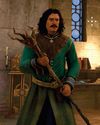Versuchen GOLD - Frei
The Secrets Of Runescape's Rise
PC Gamer US Edition
|June 2017
PC Gamer learns about the 16-year-old MMO’s allure from its venerable community of adventurers.

RuneScape is a dark horse. It’s got enough players to support two versions of the game, has a convention in London, and last year got a card game spin-off. But unlike other MMOs that have managed to stand the test of time, it can be an enigma to those looking in. So what’s been keeping people chopping down trees and killing beasties all this time?
One of the common themes among the RuneScape players I’ve chatted to is that the game got its hooks into them when they were young, and they’ve stuck with it as it’s evolved over the course of the last 16 years.
“I’ve been playing RuneScape since 2002,” Brentmcclowd tells me. “Over the years I’ve always had times where I would get tired of the game or skilling and quit, only to come back a few months later and read the updates. Usually new minigames, or quest additions with rewards that would benefit me during game activities I was already fond of, would bring me back.”
In the early 2000s, before free-to-play was part of our common vernacular, RuneScape was a seductive prospect. No subscription fees, no need to buy game cards or pester parents for credit card details—diving in was easy. While things have changed and RuneScape now has a slightly more complicated business model, starting out remains just as simple as it was in 2001.
Diese Geschichte stammt aus der June 2017-Ausgabe von PC Gamer US Edition.
Abonnieren Sie Magzter GOLD, um auf Tausende kuratierter Premium-Geschichten und über 9.000 Zeitschriften und Zeitungen zuzugreifen.
Sie sind bereits Abonnent? Anmelden
WEITERE GESCHICHTEN VON PC Gamer US Edition

PC Gamer US Edition
PREY
One of the most creatively ambitious FPS games of all time.
7 mins
January 2026

PC Gamer US Edition
"Makes me feel more like I'm lost in Holmes' mind palace"
Felt delightfully cosy and smug while playing SHERLOCK HOLMES: THE AWAKENED
2 mins
January 2026

PC Gamer US Edition
"I'm dripping with gore"
SILENT HILL F is, so far, a violent treat
1 mins
January 2026

PC Gamer US Edition
RELOOTED
Robbing the robbed back from those who robbed it
2 mins
January 2026

PC Gamer US Edition
UP TO SCRATCH
SCRATCH AND REVEAL challenges perceptions of gender
1 min
January 2026

PC Gamer US Edition
PEAK
Climbing with your friends just got more stressful.
3 mins
January 2026

PC Gamer US Edition
SCHOOL DAZE
Revisiting the school of hard knocks in BULLY
2 mins
January 2026

PC Gamer US Edition
GET STARTED IN BATTLEFIELD 6
Load up on guns and bring your friends.
2 mins
January 2026

PC Gamer US Edition
THE ETHICS OF EATING FLESH, A QUEASY QUEST IN DREAD DELUSION
Plenty of RPGs bang on about choice and consequence—this delivers.
3 mins
January 2026

PC Gamer US Edition
THE ART OF ILLUSION IN THE ELDER SCROLLS IV: OBLIVION REMASTERED
You just can't get the staff: Crispin the Preposterous's grand finale
7 mins
January 2026
Translate
Change font size
